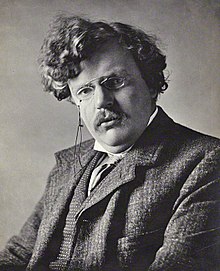I want to be able to emulate G.K. Chesterton’s charism of gratitude.
“I would maintain that thanks are the highest form of thought, and that gratitude is happiness doubled by wonder.” (A Short History of England » Ch. 6: The Age of the Crusades)
“And they specially affected one idea; which I hope it is not pompous to call the chief idea of my life; I will not say the doctrine I have always taught, but the doctrine I should always have liked to teach. That is the idea of taking things with gratitude, and not taking things for granted.” (Autobiography, XVI.—The God with the Golden Key)
“You say grace before meals. All right. But I say grace before the concert and the opera, and grace before the play and pantomime, and grace before I open a book, and grace before sketching, painting, swimming, fencing, boxing, walking, playing, dancing and grace before I dip the pen in the ink.” (early notebook, mid 1890s)*
“The test of all happiness is gratitude; and I felt grateful, though I hardly knew to whom. Children are grateful when Santa Claus puts in their stockings gifts of toys or sweets. Could I not be grateful to Santa Claus when he put in my stockings the gift of two miraculous legs? We thank people for birthday presents of cigars and slippers. Can I thank no one for the birthday present of birth?” (Orthodoxy, “The Ethics of Elfland”
Note: Often you see the above quote with “God” substituted for “Santa Clause.”
Plus this zinger:
“The Americans have established a Thanksgiving Day to celebrate the fact that the Pilgrim Fathers reached America. The English might very well establish another Thanksgiving Day to celebrate the happy fact that the Pilgrim Fathers left England.” (Chesterton in America “And What about the Quakers?”)

